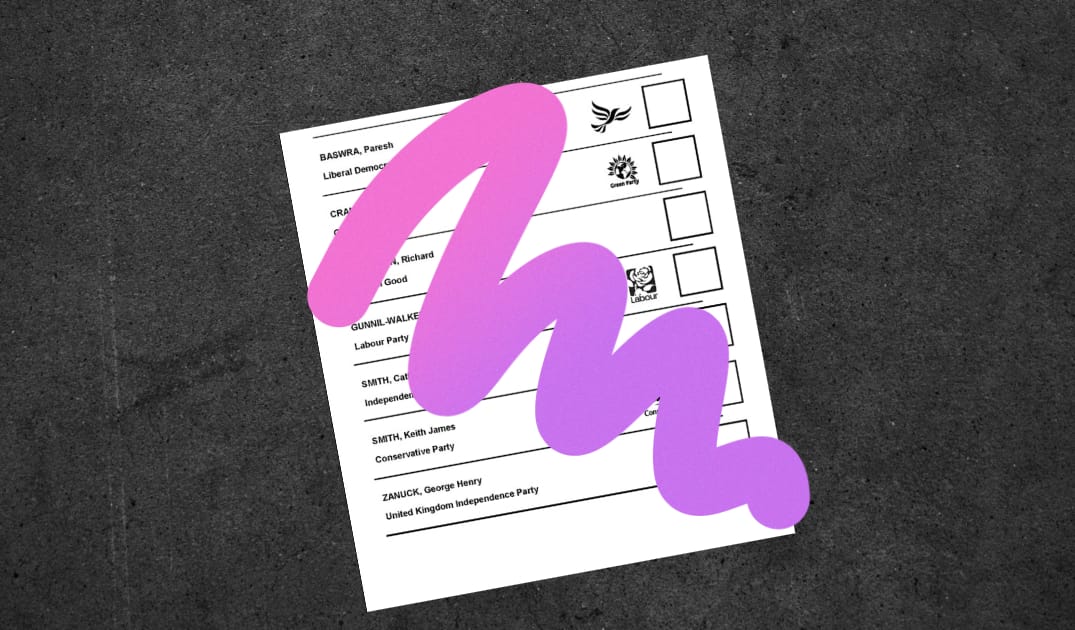This election, the biggest feeling seems to have been apathy. With many feeling disappointed with all parties, is it worth spoiling your ballot in the voting booth?
Chelsea Valentine
With the election approaching, young people across the UK find themselves at a political crossroads. Polarised between Labour and the Conservatives, dominant parties are monopolising mainstream media coverage and we've been encouraged to participate in “tactical voting", leaving many voters feeling unheard and constrained within an almost two-party system.
This lack of choice has pushed small parties to the side lines, and created a sense that it's a ‘wasted vote’ to not vote for mainstream parties. Civil disobedience and protesting have become Gen Z's bread and butter, mastering the art of taking to the streets when they feel the need to take action, illustrated by their prominent roles in movements such as Extinction Rebellion and Black Lives Matter, or university rent strikes. These protests have demonstrated the power of direct action in drawing attention to and resolving issues neglected by the establishment.
With the polls predicting a Labour supermajority, small parties stand little chance in gaining political traction and power in parliament. For voters who find themselves unwilling to support any party, spoiling a ballot is a legitimate way to express a stance and keep engaging with the democratic process outside the traditional norms.
Young people across the country have made it clear they do not feel represented in our current political arena. Climate change, education reform, the war in Gaza, and affordable housing rank as key issues for under 25 year-olds. However, these concerns have almost taken a back seat to the agendas of the mainstream political parties as they continue to focus their campaigns on securing votes from older voters who traditionally vote for them, choosing to prioritise policies around the state pension triple lock and immigration. According to reports by ITV, 61% of young people feel that their concerns about climate change alone are not being addressed by current political leaders.
So what should a voter do when they are unhappy with all parties? To many of us ‘just not voting’ doesn't feel right but when we feel like we cannot vote for anyone, maybe it's time to look toward something different. Don't vote but spoil.
Spoiling the ballot may emerge as a way for first-time voters to break the traditional political status quo. A spoiled ballot is deliberately defaced, incorrectly marked, or otherwise rendered invalid in a way that it cannot be counted as a vote for any candidate. Political messaging, notes and comments in the past have been written to clearly outline specific issues with candidates voters may have. You have to be careful though; when spoiling a ballot, simple markings may still be counted as a vote if not defaced to the point of making the ballot of invalid. The Electoral Commission reported that in the 2019 general election, there were over 186,000 spoiled ballots; however it is important to take into account that the interpretation of a spoiled ballot may not match the personal reasoning behind it. The media or political parties can take any interpretation they'd like from your spoiled ballot.
While some may hesitate, viewing a spoiled ballot as 'wasting' a vote, it clearly sends a message that 'no candidates meet my standards.' Within a local community, ensuring there's a collective spoiling of ballots may be more effective than just a few individuals deciding for themselves to spoil theirs. We've seen in other contexts for example, recent consumer boycotts for Palestine led to noticeable decline in the stock prices of companies. This collective action had large scale economic impacts: sales fell for McDonalds internationally by 0.2%. Collective boycott pressure from campaign group Fossil Free Books, led to the book festival Hay to become the first festival to suspend sponsorship from an organisation complicit in fossil fuel extraction and the Israeli occupation in Palestine. Direction action at the polling booth probably holds greater influence when taken collectively and may prompt policy revaluation within your community on topics that collectively are cared about if a broader scale of unrest and dissatisfaction is able to be demonstrated.
And even if this direct action is taken alone, it keeps voters engaged in the electoral process, while not compromising personal morals by supporting a candidate just for the sake of voting. High voter turnout is still generally seen as a sign of a healthy democracy.
As we wait for the results of this election , it is clear that young people are not just spectators but active participants in shaping the future. Whether through traditional voting or spoiling ballots, their engagement shows a determination to be heard. In this critical moment, the message from young voters is unmatched: they demand a political landscape that listens, represents, and acts on their behalf.
Thanks for reading our article! We know young people’s opinions matter and really appreciate everyone who reads us.
Give us a follow on Instagram and TikTok to stay up to date with what young people think.

